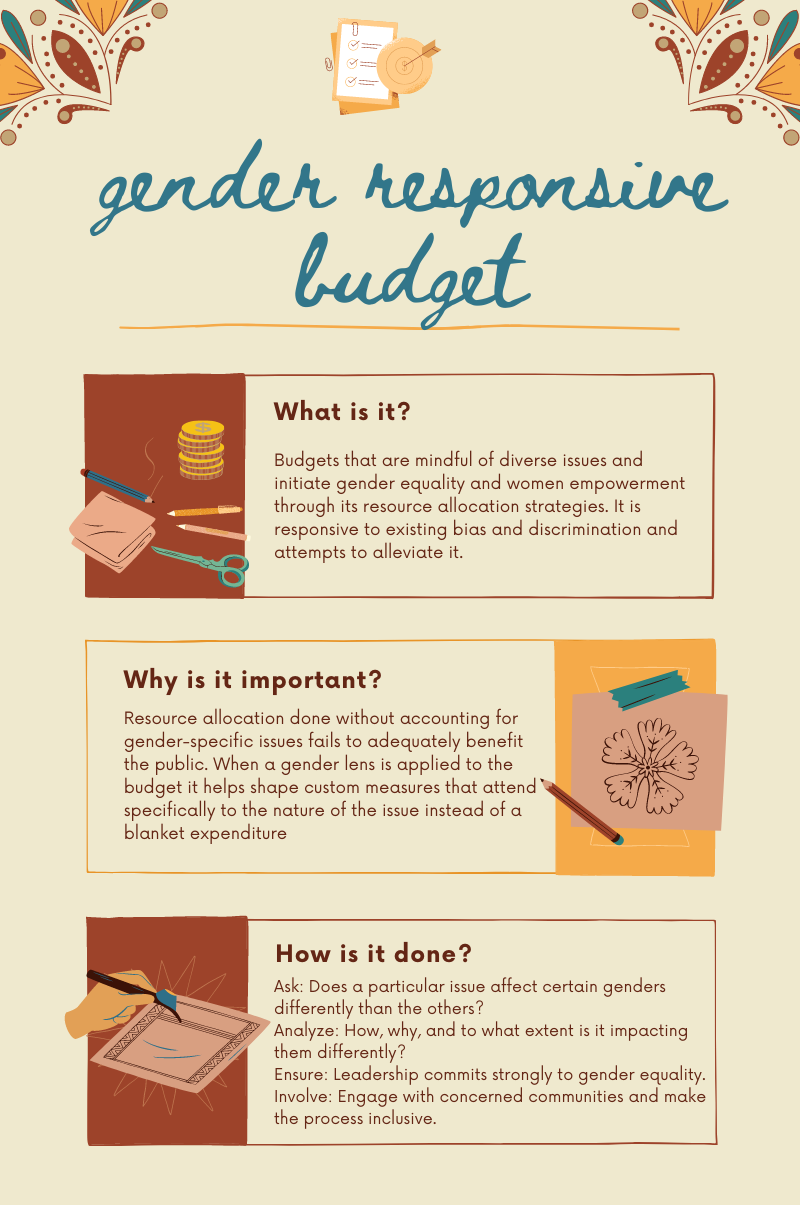Budgets : Through A Gender Lens
It is Budget season(!!) and in this edition, we talk about a key Public Finance Management tool - Gender Responsive Budgeting - in the Indian context.
Gender Responsive Budgeting In Today’s World
The COVID 19 Pandemic continues to affect livelihoods all over the world with an outsized impact on women, intensifying pre-existing gender inequalities. In this light, fiscal policies implemented by respective governments happen to garner attention, particularly with respect to their gender responsiveness. Gender responsive budgeting has gained importance globally, as a public finance tool to help address these inequalities.
UN Women reports that economic policy measures have largely been gender non-responsive, meaning that they do not recognise or address the specific challenges and vulnerabilities that women face. Even though the past decade has seen some ground breaking research on bridging the gender gap through the Budget, but we still have a long way to go.
In this edition of the newsletter, we focus on what Gender Responsive Budgeting is and how India fares on this ground - with case studies from practicing countries and the way ahead!
As always, the newsletter contains job postings shared on our WhatsApp groups.
Happy Reading!
Best,
The Newsletter Team
Defining Gender Responsive Budgeting
What is Gender Responsive Budgeting? :
Gender responsive budgeting (GRB) is a fiscal innovation that translates the gender commitments into fiscal commitments by applying a ‘gender lens’ to the identified processes, resources and institutional mechanisms; and arrives at a desirable benefit incidence. Lekha Chakraborty breaks down the concept in this World Bank Report. Read the full report here.
The Government on Gender Budgeting in India :
This FAQ manual by the Ministry Of Women and Child Development answers all questions about the institutional framework for gender responsive budgeting in India - complete with explainers on key concepts and differences.
The How and When of GRB :
Now that we know the ‘what’ of Gender Responsive Budgeting, this report by UNESCAP covers why it is important, the processes involved in different stages of a budget cycle and best practices and lessons from implementation in the Asia Pacific region.
Why does GRB matter?
“We often hear that money simply isn’t there for the things we know are needed for gender equality – [..] for redesigning the systems that we encounter every day that are not built around the needs of women. But deciding what money gets spent, and where, and how, is a political decision, and one which reveals and awful lot about the priorities of those in power.” ‘On The Engender’, a feminist policy blog highlights the importance of Gender Budgeting on their podcast.
Source: Gender Responsive Budgeting, UNWomen Asia and the Pacific; A Case Study of Gender Responsive Budgeting in India by Lekha Chakraborty; On the Engender: why gender budgeting matters; A Guide to Gender Responsive Budgeting, Oxfam Policy and Practice.
Gender Responsive Budgeting In Practice
Gender Budgeting in OECD Countries :
This OECD analysis has adopted a differentiated analysis of gender budgeting, looking at each phase of the budget process and the different institutional actors in the process as potential entry-points for gender-responsive policy-making.
Gender Budgeting in G20 Countries :
In spite of having enacted gender focused fiscal policies, the Public Financial Management tools in G20 countries to operationalize these policies are far less established. This paper takes stock of GRB practices in G20 countries and benchmarks country performance using a GB index and data gathered from an IMF survey.
Evidences from Sweden :
This paper analyses how Sweden has endeavored to reduce the gender gaps in labor markets and other socio-economic gender disparities using gender budgeting as a tool of accountability, using a dual approach within Public Financial Management Tools.
Making Every Woman and Girl Count in Morocco :
Morocco has a long history of gender responsive budgeting work with sustained, high-level political will to address gender equality. In this Gender Report UN Women highlights information on the work in Morocco conducted by each sector disaggregated by gender (where data allows), which has become an important accountability and monitoring tool.
Gender Budgeting In India :
In this article, Shreya Raman highlights the key trends and allocations in India’s Gender Budget and what it has achieved and failed to achieve.
The Union Budget 2022 : A Gender Lens
What has gone wrong with GRB in India - The story so far :
This article analyses the two prime strategies adopted by the Government of India for institutionalizing GRB, namely, the “Gender Budget Statement” and Gender Budgeting Cells to highlight what has gone wrong, and what needs to be fixed.
What Women Want(ed) from the Union Budget 2022 :
This article puts out what women should expect from this year’s budget - from higher budget allocations to GST rate reductions - it covers aspects key to bridging the economic gender gap in India.
This article suggests women centric measures from job opportunities to tax reductions before the Budget 2022.
What Women Got from the Budget 2022 :
In this article, Jagriti Chandra discusses how the budget for women and children actually shrank this year.
Women’s Component Plan and Gender Budgeting in India:
This article is a short read on the evolution of Gender Responsive Budgeting in India through the women's component plan in 1974.
Is The Blueprint for Amrit Kaal Actually Inclusive?
This article sheds light on the inclusivity of the Union Budget 2022, with estimates and allocations to the Gender Budget this year.
The Union Budget: At the Intersection of Gender and Caste
Advocacy Group's Demands From Budget 2022-23:
This article sheds light on the discrepancies of Budget 2021-22 which saw virtually no change in allocations for health, food security, pensions and so on and actually saw decreased spending for some sectors, such as education. It talks about the expectations of the advocacy group from the union budget 2022.
Budget cuts for Dalit women, drop in allocation for SC & ST education: National Campaign on Dalit Human Rights:
The National Campaign on Dalit Human Rights – Dalit Arthik Adhikar Andaloan (NCDHR-DAAA), in its detailed analysis of the budget, has pointed out that budgetary allocations in the 2022 Union Budget do not address the development gap between the marginalised and discriminated communities and the rest of the population of the country. Read the detailed article here.
Social Welfare Spending in 2022-23 Budget:
The Union Budget has seen a fall in budgetary allocations for crucial social security schemes including MGNREGA (more details in this article), the Mid-Day Meal scheme, and ICDS. This article highlights key schemes that were neglected in the budget.
You can explore detailed scheme-wise changes in social expenditure using this Union Budget 2022-23 Explorer.
Job and Internship Openings
Note: These are jobs shared by members over WhatsApp over the last 2 weeks. Please check if positions are still open before applying. If you are thinking about applying to one of these, you can also drop a message on the WhatsApp group or on the google group to connect with members currently working in these organisations.
Job Openings
Multiple openings at LEAD at Krea University
Operations and Client Success Partner at Qure.ai (Mumbai/Bangalore, India)
Multiple Research Associate openings at Inclusion Economics India (formerly EPoD India at IFMR) in Patna and Raipur, India
Asia Residency Program at Dalberg (Mumbai/New Delhi, India)
Multiple openings at The Converge Foundation
Research Associate at J-PAL South Asia - Breakthrough Project (New Delhi, India)
Internship Openings
Other Opportunities
Call for Mentors by Purple Connect
This newsletter was put together by Amruuta, Ridhi, Vasanthi, Anahita, Ria and Prerna.
Have thoughts on our newsletter, or ideas for other activities we should consider? Follow us on Twitter and Instagram or send us an email! We’d love to hear from you and work on what we can do better!






